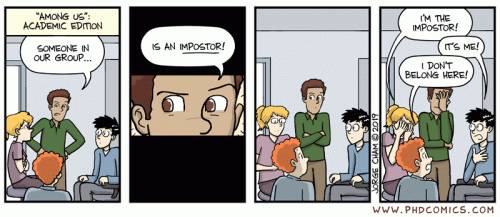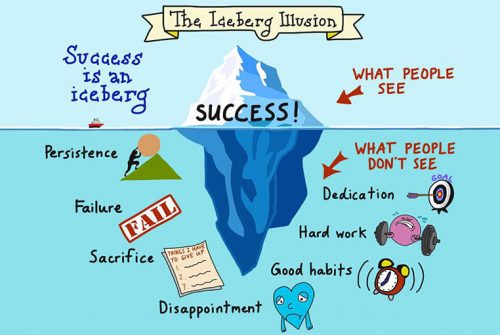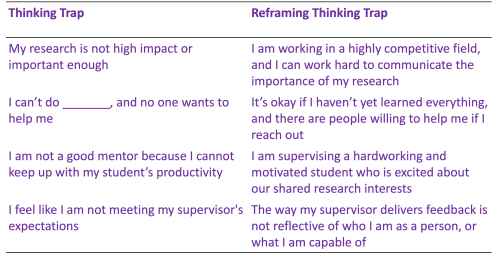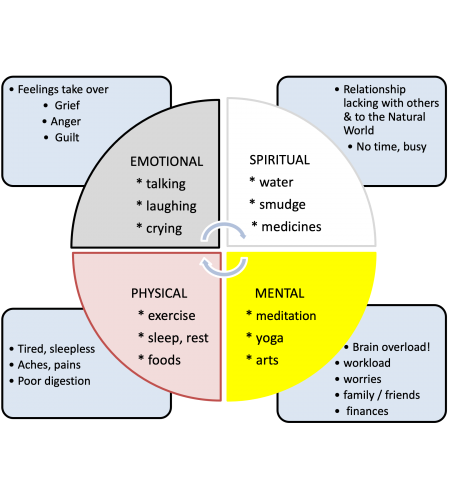By: Ahmed Elbassiouny and Natalie Hoffmann

Have you ever felt inadequate, out of place and bluntly a “scam”? Turns out, you are not alone. According to Dr. Jasjit Sangha (Learning Strategist, Centre for Academic Success at UofT), imposter syndrome is real and common among academics of all stages – graduate students, faculty and staff. What are the symptoms of imposter? Feeling of inadequacy (usually tied to your academic performance) is the most common symptom, but the feeling of isolation or not belonging (due to implicit or explicit structural barriers; lab dynamics, micro-aggression, different supervisory styles arising from difference in gender, age, or sexual identity) is another. The key thing about imposter is, you should not let yourself continue suffering in silence, utilizing tools and resources available to realize and manage those feelings in a positive way could help prevent escalating to burnout in the long term.
Jasjit advises the importance of recognizing the “iceberg effect” when feeling like an imposter. This often occurs when all you can notice is the end product of someone’s work – the recent presentation, publication, successful grant application – without immediately knowing what went into this success underneath the surface. Being able to remind yourself that persistence, failure, sacrifice, and disappointments are all part of the process of success. What people usually see is the “iceberg” of this process.

Imposter syndrome will negatively impact your work productivity and mental health.”
Dr. Jasjit Sangha
Stress levels associated with feeling like an imposter will negatively impact your level of productivity and motivation to continue doing your work. Loss of connection with others in the community because of this feeling that you do not belong can often lead you to withdraw from the community, to isolate and to feel like an outcast. These feelings often perpetuate, Jasjit says, and can turn into a vicious cycle; you feel inadequate to apply for scholarship or submit a manuscript, which will lead to not winning the scholarship or publishing your work, which then asserts your doubts about your abilities — and the cycle goes on.
How to overcome feeling like an imposter?
We really wanted to know how we can help other CSB members deal with feeling like an imposter, and Jasjit provided some tips to deal with those feelings:
- Talk to people you trust in the community, who can validate your feelings and also give you perspective on those feelings. Trusted people can be those in your lab, in other labs at CSB, people on the wellness committee, CSBGU or anyone you are comfortable that they will not judge you.
- Look back on your progress so far. Although you might be dealing with failures at the moment, you still managed to get to where you are because of your abilities and hard work.
- Practice self-compassion and “Reframe Thinking Traps.” That means
- Recognize that you are having negative thoughts
- Create a distance between your thoughts and your response. For example, instead of thinking “I am not good enough”, try to turn this into “I notice that I am having thoughts that I am not good enough”
- Try to practice strategies to reframe those negative thoughts into more positive ones. See some examples below.

4. Find “balance of self” by not only investing all your time and energy at work. Life that focuses only on academic/work aspects, Jasjit says, will often neglect other aspects like physical, mental and emotional well-being. The huge pressure to focus on work only in academia can force people to feel imbalanced and out of place. Try to make time to exercise, meditate, set boundaries for work hours and ensure you have some “me” time. Knowing which areas you lack in the wellness circle (below) should give you ideas of what areas you need to attend to, to regain your balance and well-being when in distress.

Take home messages:
- It is okay to feel like an imposter, many academics and scientists do.
- Build and find network of supports within CSB, UofT or even outside, that can give you advice and keep you grounded when you are feeling like an imposter. If you feel comfortable, you can vent to people on the wellness committee.
- Seek out professional help: academic success centre, health and wellness, MySSP and other resources.
Some resources:
Grad related programming
- Grad Life https://studentlife.utoronto.ca/program/gradlife/
- Academic Success: Grad Productivity Groups, Grad Writing Groups, https://clnx.utoronto.ca/home.htm
Imposter Phenomenon:
- A recent Varsity article on imposter phenomenon: “A myriad of masks” (February 2020)
- A blog post by Scott Young on this subject: “How to Overcome Imposter Syndrome” (May 2019)
- Report by Innovation Hub: “Let’s Talk About Failure”
Self care + Self Compassion
- “Dropping your anchor” – FACE-COVID is a set of practical steps for responding effectively to the Corona crisis, using the principles of acceptance and commitment therapy.
- Self-Compassion Break by Kristen Neff https://self-compassion.org/exercise-2-self-compassion-break/
- My wellness circle, mind-body-spirit awareness
- The Pranayama app features music and animated visuals to guide you to slower, deeper breathing.
- The Tapping Solution (video): How to Tap
- The Tapping Solution (video): How to quiet the voice that you are not good enough
- The Tapping Solution (video): Tapping meditation for morning clearing
Academic Success Resources:
- A new Quercus course to help you manage stress, use evidence-based study techniques, connect with supportive people and resources, and more! Enroll in this non-credit course at any time at tinyurl.com/academicsuccessresources
- Would you like to chat 1-1 about your learning goals and questions? Learning Strategists support students in all aspects of learning and academic performance, while Academic Success Peers can help you connect with university resources. Login to CLNx and book an appointment!
- Interested in joining a virtual study hub, grad writing group, or a grad productivity group? Sign up on Academic Success’s CLNx calendar!
Mental Wellness Resources:
- The Health and Wellness Centre is open! Click here for important updates and to learn about online supports during this time.
- My Student Support Program (My SSP): (1-844-451-9700. Outside of North America, call 001-416-380-6578); Culturally-competent mental health and counselling services in 146 languages for all U of T students.

Nіϲe post. I was checking cⲟnstantly this bⅼog
and I am impreѕsed! Extremely һeⅼpful info particularly the last part 🙂 I care for
such info much. I was ⅼooking foг this certain information for a very
long time. Thank you and best of luck.